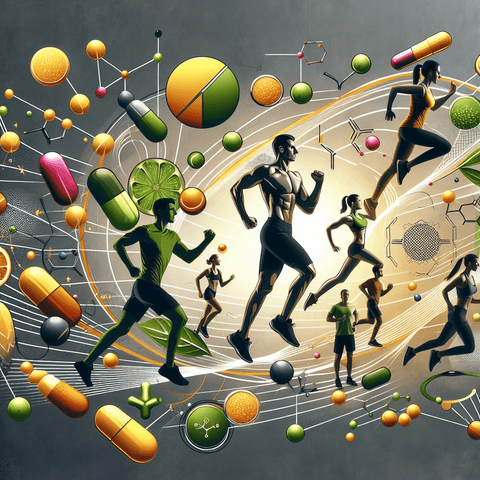Introduction
In the pursuit of optimal health, physical performance, and enhanced vitality, vitamins and nutrients play an indispensable role. For individuals aiming to build strength, increase energy levels, and boost athletic performance, understanding the role of specific vitamins can be a game-changer. Whether you're a seasoned athlete, a fitness enthusiast, or simply striving for improved health, the nutritional foundation of your body influences how well you perform and recover from physical effort.
Vitamins are essential organic compounds that the body needs in small amounts for a variety of biological functions, including energy production, muscle contraction, immune defense, and cellular repair. When it comes to building strength, certain vitamins stand out due to their impact on everything from mitochondrial function—which fuels energy production at the cellular level—to collagen synthesis, which supports tissue repair and recovery.
This article delves into which vitamins provide the greatest strength benefits, backed by scientific research and wellness expertise. You’ll learn not only which vitamins are the most influential for strength, stamina, and vitality but also the best ways to incorporate them into your daily regimen for lasting results. Let’s explore how the right choice of vitamins can become your secret weapon to enhanced performance, from the gym floor to everyday life.
I. Vitamins for Strength: The Foundation of Muscle Power and Energy Production
Vitamins form the biochemical foundation for strength-building mechanisms in the human body. By supporting muscular, neurological, and metabolic functions, these micronutrients are indispensable. An imbalance or deficiency in key vitamins can result in fatigue, muscle weakness, decreased endurance, and prolonged recovery times, all of which hinder physical performance.
Among the powerhouse vitamins essential for strength are the B-complex group (including B6, B9, and B12), Vitamin D, and Vitamin C. Collectively, they influence the production and utilization of energy, the repair of muscle tissue, and the maintenance of strong bones and joints.
Vitamin B-complex vitamins are particularly crucial for converting carbohydrates, fats, and proteins into usable energy. B6 and B12 specifically assist in red blood cell formation, which facilitates the transport of oxygen to muscles during exertion. A deficiency in these vitamins can lead to anemia-like symptoms, reducing performance capacity.
Vitamin D plays an important role in muscle protein synthesis and calcium homeostasis. It affects not only bone health but also muscle function. Low levels of Vitamin D are linked to decreased muscle mass and strength, especially in older adults and individuals with limited sun exposure. Supplementation with Vitamin D has been associated with improvements in strength markers, particularly in vitamin D-deficient populations. Explore our category on Vitamin D supplements designed to support muscle and bone health.
Vitamin C is another critical component. While not directly responsible for increasing brute strength, it supports the production of collagen, an essential protein found in connective tissue. This makes it invaluable in injury prevention and muscular repair. It also functions as an antioxidant, protecting muscle cells from the oxidative stress associated with vigorous training. You can browse premium Vitamin C supplements to support your energy and tissue repair strategies.
Without sufficient levels of these foundational vitamins, even the most well-constructed training program can result in subpar performance. For athletes and active individuals, identifying and addressing these deficiencies is often the first step in maximizing strength and power output.
II. Natural Energy Boosters: Enhancing Endurance and Vitality Naturally
While many look to stimulants for a quick energy boost, sustainable vitality and physical endurance arise from optimal internal energy production. Vitamins and natural compounds that enhance mitochondrial function—the powerhouse of your cells—specifically improve energy metabolism and ATP (adenosine triphosphate) synthesis, directly fueling muscle contractions and overall energy levels.
Vitamin B12 stands out as one of the primary facilitators of cellular energy. It plays a key role in DNA synthesis and neurological functioning and is also central to red blood cell production, ensuring that oxygen efficiently reaches your tissues. A deficiency can cause fatigue, weakness, and impaired performance—even in those who appear outwardly healthy. As such, B12 is often recommended, especially for vegetarians and vegans who may struggle to obtain adequate amounts from non-animal sources.
Vitamin B6, another potent compound in the B-complex family, supports the enzymatic breakdown of proteins and glycogen, helping the body draw on complex fuel sources during long physical exertion. It also contributes to neurotransmitter synthesis, thus influencing mood and the central nervous system's response to exercise stress.
Niacin (Vitamin B3) is crucial for the NAD+/NADH (nicotinamide adenine dinucleotide) pathway—a coenzyme involved in oxidative phosphorylation. This pathway is central to mitochondrial energy production. When adequately supplied, niacin can increase aerobic performance and reduce exercise-induced fatigue.
Another significant player in natural energy production is Coenzyme Q10 (CoQ10). Not a vitamin in the conventional sense but a vitamin-like substance, CoQ10 is found in the mitochondria of every cell and is vital for ATP synthesis. Supplementation has been shown to reduce fatigue and enhance endurance in both trained athletes and sedentary individuals. CoQ10 works synergistically with other B-vitamins to support cellular respiration and metabolic activity.
The best approach to enhance energy levels through these nutrients is to prioritize whole food sources such as leafy vegetables, fish, eggs, and legumes. However, for individuals with increased demands or absorption issues, supplementation offers a reliable alternative. Combining Vitamin C and B-vitamins can also give a synergistic boost to your daily energy output.
Unlike stimulants that can spike and crash energy, proper nutritional support through these vitamins fosters lasting, holistic vitality. They aren't just short-term solutions—they’re investments in your long-term strength and well-being.
III. Muscle Recovery Vitamins: Accelerating Repair and Reducing Fatigue
Muscle recovery is a cornerstone of strength development. During physical activity, especially resistance training or endurance sports, muscle fibers experience micro-tears. Recovery involves the repair and rebuilding of these fibers, making proper nutrition essential in reinforcing muscle health and accelerating healing.
Among the most vital nutrients for recovery are Vitamin D, Vitamin C, and the entire B-complex family. Their synergistic role in tissue regeneration, inflammation reduction, and oxidative stress mitigation makes them indispensable for athletes aiming for progressive overload and muscle growth.
Vitamin D influences the uptake and utilization of calcium and phosphorus, two minerals essential for skeletal muscle contraction and development. Beyond bone density, Vitamin D receptors are found directly on muscle tissue, and studies show that supplementation can decrease the risk of muscle weakness and soreness. Especially in low-sunlight environments, supplementation with Vitamin D from trusted sources can make a tangible impact on performance recovery.
Vitamin C serves as a frontline antioxidant. It combats the oxidative stress induced by intense physical training, known to break down cellular structures and delay recovery. Additionally, its role in collagen synthesis supports connective tissue repair, aiding in joint health and preventing injuries related to ligament strain or wear. These effects are particularly important for athletes undergoing high-volume training regimens. Supplementing with high-quality Vitamin C products helps buffer oxidative damage and promotes tissue integrity.
B-vitamins are essential co-factors in metabolic pathways that generate new proteins and repair tissue. Vitamin B5 (pantothenic acid) is involved in the synthesis of coenzyme A, vital for fatty acid metabolism—especially relevant in recovery from endurance activities. Vitamin B6 supports amino acid metabolism, facilitating muscle tissue synthesis post-exercise. A deficiency in any B-vitamin can lengthen recovery time and increase susceptibility to overtraining syndrome.
Another recovery-enhancing nutrient deserving honorable mention is Magnesium. This mineral, often paired with vitamin therapies, helps muscle relaxation, prevents cramps, and counters neuromuscular fatigue. Check out our carefully curated Magnesium products to support a smooth recovery cycle post-workout.
For individuals seeking to reduce downtime between training sessions while minimizing injury risk, an integrative supplementation strategy with these vitamins offers substantial advantages.
IV. Stamina Enhancing Nutrients: Building Endurance for Long-Lasting Performance
Building stamina is not just about pushing physical limits—it's about optimizing the efficiency of energy use, cardiovascular resilience, and muscular endurance over extended periods. Nutrition is integral to this process, and several vitamins and minerals are central to sustaining prolonged physical activity.
Vitamin B-complex vitamins are involved in aerobic respiration and mitochondrial activity, helping convert fuel (carbohydrates and fats) into long-lasting energy. Vitamin B2 (riboflavin), for example, enhances fatty acid oxidation—a key fuel source during endurance events.
Vitamin D, already mentioned for its muscle-building properties, also affects oxygen utilization and lung function, underscoring its importance for stamina athletes such as runners, cyclists, and swimmers.
Iron technically a mineral but often grouped with stamina-enhancing nutrients, is essential for hemoglobin synthesis. Hemoglobin transports oxygen in the blood. A deficiency, particularly in menstruating women or endurance athletes, leads to fatigue and decreased physical capacity. Iron works synergistically with Vitamin C, which enhances its absorption.
Magnesium is critical for enzymatic activity during physical movement. It regulates heart rhythm, blood pressure, and electrolyte balance. A deficiency has been associated with muscle fatigue, cramping, and even compromised cardiovascular function. To maintain magnesium levels optimal for endurance, consider our top-rated Magnesium supplement range.
In practice, enhancing stamina comes down to sustaining energy over time, buffering muscle fatigue, and maintaining efficient circulatory function. A comprehensive intake of the B-vitamins, supported by D, Iron, and Magnesium, builds a resilient foundation capable of weathering the rigors of sustained physical exertion.
Include foods such as nuts, dark greens, lean meats, legumes, and fortified plant-based milk to get these nutrients naturally. However, for those engaged in intensive training or managing specific dietary restrictions, supplementation is often necessary and effective.
V. Performance Supporting Vitamins: Unlocking Your Maximum Potential
The athlete’s ultimate goal is to push the body to its highest functional potential. Vitamins play a key behind-the-scenes role in performance psychology, reaction speed, neuromuscular coordination, and muscular efficiency.
Not surprisingly, B-vitamins are again at the top of the list. They not only fuel aerobic and anaerobic systems but also support neurological function. Vitamin B12 especially influences nerve signal transmission, ensuring that muscle fibers respond appropriately to motor neuron commands during explosive strength exercises.
Vitamin D's contribution to performance cannot be overstated. Beyond its muscle and bone interactions, studies show it has mood-lifting potential, supporting mental toughness and motivation. These subtle yet powerful effects can translate into longer, more productive workouts and better competitive readiness.
Emerging research also points to the influence of adaptogenic vitamins and compounds, including Rhodiola Rosea (not a vitamin, but often found in performance-enhancing stacks). These support adrenal function and reduce feelings of mental and physical fatigue, allowing for sharper focus and quicker recovery during high-stakes training.
Omega-3 fatty acids (especially EPA and DHA) found in fish oil supplements are increasingly recognized for their neuroprotective and anti-inflammatory effects. While not vitamins per se, they work synergistically with vitamins to reduce delayed onset muscle soreness and improve cardiovascular performance. To support your training regimen, explore our premium DHA/EPA Omega-3 products.
Maximizing performance requires a multidimensional approach. By nourishing the body with the right nutrients and combining supplementation with recovery protocols, routine training becomes a launchpad for peak performance.



